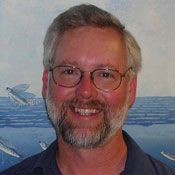
“Dare to be Trivial”Presented by Dr. Anthony Michaels, Managing Director, Proteus Environmental TechnologiesAbout the TalkUniversities are homes for extraordinary innovation and scholarship. Almost by definition, environmental scholarship has the additional requirement of being relevant to one of the key challenges for the sustainability of life on this earth. Whose job is it to make that relevance real? What are the tools that we use to bring innovations in thought and technology to the lives of the broader public? Most importantly – what is the scale at which we strive to effect change? The problems are so vast and the route to scale so daunting. I propose that we “dare to be trivial”. Pick big challenges and go to the heart of what it takes to execute on a real change at scale. Then ask – what will it take to change 5% of that global environmental challenge through an innovation? That might be trivial, but it is not irrelevant. How can we do it fast? I have chosen to stray from the academic path to look at “high-leverage” methods of changing society through innovation. My toolkit of choice is a combination of new approaches to investing, a hybrid technology development path for innovations and a complex systems perspective. Using real examples that are as diverse as energy efficiency, recycling, waste-to-value and agriculture, this toolkit shows promise for taking academic knowledge to scale – rapidly – and to creating alternate paths to sustainability that leverage the power of market forces. It is complementary to the more traditional toolkits for change such as policy, innovation startups and education. I think that this niche – fairly unpopulated at this time, is a wonderful new opportunity for clever research universities to magnify the relevance and value of scholarship on a path to a better planet.About the SpeakerTony Michaels has 21 years of leadership experience in environmental science, systems thinking and entrepreneurship. He was the founder and Director of the Wrigley Institute for Environmental Studies at the University of Southern California from 1996-2008 with combined research and operational budgets of over $15M per year and over 100 faculty, staff and students. He has 27 years of experience in marine and environmental research including research on the global carbon cycle and the role of the oceans in absorbing carbon dioxide, a major greenhouse gas. He co-created and managed a program on the value of climate forecasts in the management of hurricane-related risks by the international reinsurance industry. He was the founding President of the Council of Environmental Deans and Directors, a professional organization for leaders of academic environmental programs that now involves over 140 universities and colleges. He attended the University of California, San Diego (1976-1979), the University of Arizona (B.S. 1982, M.S. 1983) and the University of California, Santa Cruz (Ph.D. in Biology, 1988). He worked at Woods Hole Oceanographic Institution and the Bermuda Biological Station for Research before coming to USC in 1996.



